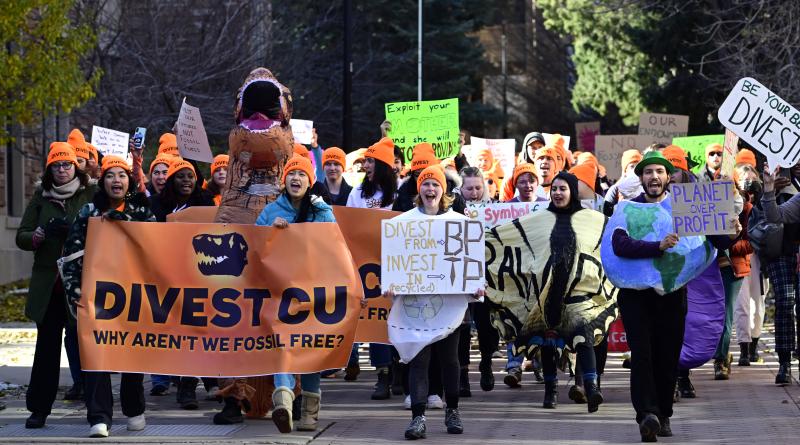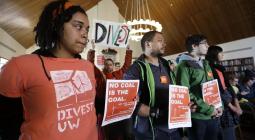CU Regents considering divestment from fossil fuels after public pressure

Over the past few months, more than 100 people, mostly students, have attended University of Colorado Board of Regents meetings to demand that the CU system be divested of fossil fuels.
About 3% of the CU system’s investments are in the energy sector, including oil and gas. CU has no direct stake in any company as per state law.
On Wednesday, the University of Colorado Board of Regents Finance Committee heard two presentations about the system’s divestment from fossil fuels.
Two opposing viewpoints were presented in it. Tom Sanzillo, director of financial analysis at the Institute for Energy Economics and Financial Analysis, spoke in favor of divestment from fossil fuels and made a financial case for it. Nick Loris, vice president of public policy at C3 Solutions, argued that divestment is ineffective and counterproductive.
SanZillo presented data to show that fossil fuels have underperformed the stock market for a decade and that its long-term financial outlook is negative.
He said this decline in performance is due to changes in competition among fossil fuel producers, competition from new technologies, and a lack of preparation to navigate the energy transition.
Because of this, Sanzillo argued, investing in fossil fuels poses a risk to the long-term value of the investment fund.
“The reason for the argument (to disinvest) is a financial reason, and that is that the energy sector has been in crisis over the last 10 years and it continues to be in crisis and it looks like it will continue to grow as the outlook is negative. ,” Cenzillo said.
Sanzillo acknowledged that what the regents are being asked to do is “not fun,” but climate change is an essential issue they must confront.
“As university leaders you also have another function, a leadership function, and that means you don’t get to choose whether you’re going to do something on climate change or not,” Sanzillo said. “The university clearly has another responsibility to its students, and as leaders you are an example to them of how this is addressed and what steps are taken to address this issue.”
Other universities that have decided to divest from fossil fuels include the University of California, Harvard, Stanford, Princeton, University of Michigan, Columbia, Johns Hopkins, and the University of Minnesota.
Loris presented an opposing view and said that divestment is ineffective because it opens up investment opportunities for others, others who potentially care less about environmental and social returns. He cited leading scholars and investors who care deeply about climate change but argue that the emissions impact of divestment is modest.
Additionally, he said that divestment is counterproductive because it reduces the ability to be directly involved and influence the behavior of companies, even though CU does not hold personal stock in the companies as required by state statute.
He said there are potential disadvantages and costs associated with divestment including increased trading and compliance costs and reduced diversification of investments.
“The reality is I don’t know whether divestiture is a fiscally prudent decision,” Loris said. He added, “The evidence I’ve seen about the harms to investors from disinvestment is mixed.”
Loris said fossil fuels will continue to play a major role in the successful transition from fossil energy to clean energy.
“I understand that the sentiment of divestment advocates may be that these companies should go out of business entirely and fossil fuels should be reduced to zero, but to the extent that you see these companies making solid investments in low carbon technology, … As opposed to greenwashing, I think it’s a meaningful step in the right direction,” Loris said.
No actions or next steps regarding fossil fuel divestment were discussed by the Regents following the presentations.
Regent Leslie Smith said she would support divestment but did not believe the Board of Regents had the desire to do so. She said she would like to see CU be more aggressive with its sustainability goals.
“I just feel like if we’re not going to divest, we should at least be as aggressive as we can,” Smith said. “Obviously we have a limited budget because we don’t have a lot of funding from the state, but we’re trying to move more toward a clean energy CU system.”
CU System Chief Financial Officer Chad Marturano concluded the session with an overview of CU’s sustainability efforts.
The CU strategic plan includes sustainability targets by measuring energy use intensity, greenhouse gas emissions and facility condition index. Each is reported annually and measured against the system’s 2026 energy goals.
Marturano said all campuses participate in environmental practices including waste diversion, composting, recycling and renewable energy production.
CU Boulder’s climate action plan is nearing completion and will be adopted in 2024, he said. The campus is also switching to electric vehicles and offers 474 sustainability-related courses in 52 departments.
All major renovation and new construction projects are subject to additional review by the CU Design Review Board, Marturano said. CU Boulder employs a sustainability expert to consult on all major projects to continue progress toward energy goals. CU Boulder aims to reach net zero emissions by 2050.
“All of these things we approve of, what we do, how we conduct our business to achieve our mission at CU, these are places where we are a leader in sustainability in the state and throughout the world,” Marturano said. Make a solid impact.” “A lot of this has to do with our footprint in terms of our buildings where we can actually make reductions and quantify the amount of greenhouse gas emissions in metric tons that we are reducing over time.”
For more information about the meeting and presentations, visit go.boarddocs.com/co/cu/Board.nsf/Public.
Source: www.bing.com






